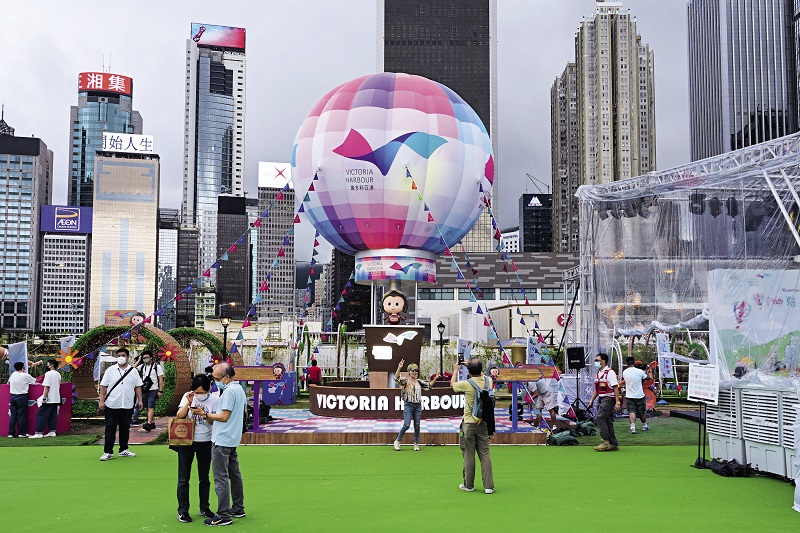As a Hong Kong scholar, the author presents an insider’s analysis of Hong Kong’s development since its return to the motherland, showing the faith in Hong Kong’s prosperity in years to come.

Benjamin Chiao
Hong Kong’s momentous return to China in 1997 bisected the course of my life. To escape poverty, my family had emigrated to Hong Kong from Shantou in the 1970s before China’s reform and opening-up drive kicked in. My early childhood was spent in wooden squatter settlements and on the streets of Hong Kong, helping my family to survive by selling fruit, noodles, and newspapers. The hard work of my parents and siblings for a solid decade elevated us to the middle class. My father survived WWII, had no schooling and never supervised my study; my mother dropped out of school after just a few years. With little to depend on, hard work was the only way to survive. I eventually got my bachelor’s degree from the Hong Kong University of Science and Technology in 1997, worked a few years and then went on to gain my Ph.D. at the University of Michigan, and returned to China as an assistant professor at Peking University in 2008. I am now dean for Asia and trustee of a few European universities, academic chair of an artificial intelligence industry association in Shenzhen, and board chairman of an incubator in Qianhai, Shenzhen. My siblings are also professionals running their own businesses.
My family’s story is not atypical. Migration across the Shenzhen border was among the most massive in modern times. Hong Kong was instrumental in helping China to open up, especially in the early days of the country’s reform and opening-up drive that started more than 40 years ago. The country’s dramatic changes are a source of pride to many Chinese, both at home and abroad. China helped Hong Kong to thrive, especially after the country’s accession to the WTO, but also during difficult times like the Asian financial crisis of 1997, the global financial crisis of 2007-2008, and the two pandemics.
Some of Beijing’s policies calculated to assist Hong Kong have been highly effective. The SARS outbreak in 2003 sent Hong Kong into recession. China accordingly adapted its travel policy through the Individual Visit Scheme whereby mainlanders could travel to Hong Kong individually rather than as part of a tour group. The result was immediate and positive growth. Mainland visitors to Hong Kong increased 18-fold since the handover, right through to the protests there in 2019 that temporarily destroyed the economy. China also helped to build makeshift hospitals in the region, and sent medical workers, vaccines, and supplies when Hong Kong fell prey to the COVID-19 Omicron variant earlier this year.
As an economics professor, I frequently discuss with students the pros and cons of China’s economic policies. Like any other country, China is of course not without problems. But the Chinese government is skilled at experimenting new ideas, having regularly carried out policy pilots in various cities before formally rolling them out nationwide. This is not to say that all officials flawlessly perform their duties. But if you have ever talked to anyone in China you must have observed that there are no shortage of sharp, knowledgeable administrators who care about the country’s citizens. It was they who have worked on the frontline to protect the lives of the people during the pandemic.
Under the “one country, two systems” policy, other than in areas of national security and international relations, Hong Kong has high autonomy in running the city. In my opinion, China has delivered what it promised. Hong Kong remains a free market with a sound legal system, and common-law system countries continue to use post-handover court decisions made in Hong Kong as precedents for their own cases. Hong Kong continues to be a global center for finance, commerce, and trade, the home of international corporate headquarters, and a major investment, transportation, and logistics hub.
Since the handover, Hong Kong’s GDP has doubled. Although impressive by world standards, however, the region’s per capita GDP is a third less than Singapore’s, whereas in 1997 they were about the same. This is not surprising. The region is grappling with deep-seated problems in its political systems, housing, economic structure, and youth development, among others.
There were serious problems on the political scene before the enactment last year of the Law on Safeguarding National Security in Hong Kong. Upon leaving Hong Kong in 1997, the English introduced political competition. Oftentimes the legislative council would veto economic plans that were clearly beneficial to Hong Kong. For example, the amount of land reclamation dropped 10-fold, even though the urgency of gaining new land has been underlined by Hong Kong’s exorbitant house prices. Opposite groups used reasons such as environmental protections to sabotage projects.
As the new security law and rules regarding the election of Hong Kong’s chief executive are now in place, the eyes of the world are on whether or not Hong Kong is back on track to take full advantage of mainland’s phenomenal growth. This is especially compelling in light of the Guangdong-Hong Kong-Macao Greater Bay Area Plan to link Hong Kong, Macao, and nine other cities in southern China’s Guangdong Province which could significantly diminish deep seated problems such as pricey apartments in Hong Kong. A Hong Kong resident could make the 30-minute commute from a Guangdong apartment costing a tenth of the price of one in Hong Kong to their workplace there. And why not? Many New Yorkers commute daily from New Jersey to the “Big Apple.”
Two years ago, as tensions between the U.K. and China increased, the U.K. relaxed its citizenship policy in regard to Hong Kong residents. Many indeed took this opportunity to emigrate to the U.K., but there are at the same time lots of people moving from the U.K. to China, especially to the Greater Bay area, to start businesses.

To celebrate the 25th anniversary of Hong Kong’s return to the motherland, the HarbourChill, a themed harbourfront space located next to the Wan Chai Ferry Pier in Hong Kong, takes on a new look on June 16, 2022.
A one-hour-drive from HK takes you to Shenzhen, Guangzhou, Macao, Zhuhai, and certain other Greater Bay Area cities. People living in these Chinese cities already enjoy a per capita GDP equal to that in Spain and Italy. The Greater Bay Area is now commonly deemed as the most prosperous and innovative area on earth! Patents filed here over the last five years have doubled those in Silicon Valley. This is in sharp contrast to the pessimistic picture that the West has painted of Hong Kong, especially during the color revolution.
During the 2019 unrest in Hong Kong, many residents shouted such slogans as, “Let us follow the successful Ukraine model!” We now see how the situation in Ukraine has deteriorated since the 2014 color revolution, the legitimately elected Ukrainian government was overturned, and pro-Western parties were included in the interim government.
The reforms that the Election Committee of Hong Kong Special Administrative Region (HKSAR) has undergone in regard to its size, composition and formation method, and extent of power, have ensured that more patriots will be governing the city.
We all know it is an election by 1,500 representatives, rather than universal suffrage, but it is nevertheless a zero-to-one improvement since the hand-over. Meanwhile, the Western democratic system is showing their deficiencies. We do not, for example, see a full voter turnout, and the winner gets fewer votes than may be expected. In many instances, the U.S. presidents elected have represented only a small subset of all U.S. citizens.
In recent years, the U.S. has done its utmost to convince the world of Hong Kong’s imminent demise, notably through interference in Hong Kong affairs calculated to deter China’s development. So far, these moves have proven futile.
Hong Kong has showed its resilience and remains extremely strong as an international financial center. The region also tops the charts as regards raising IPO funds. In 2020, HK $500 billion IPO funds were raised in Hong Kong — a 50 percent increase year on year. The banking system, meanwhile, has a HK $15 trillion deposit — an 8 percent increase year-on-year. And Hong Kong is once more among the top three financial centers, according to the Oxford Metrica Survey 2021. The setback was due to the 2019 Hong Kong protests, and the pandemic.
The pandemic in Hong Kong is more or less over. While the challenge remains, more opportunities are becking. There are now many SOE subsidiaries and private firms from the mainland stationed in Hong Kong, all of them eager to engage with prospective world business partners as Hong Kong has gradually reopened to world travellers.
There are bound to be more travellers coming back to Hong Kong this year. Some will feel that Hong Kong is, as ever, an efficient market economy. Others may feel that Hong Kong has become more “Chinese.” But why should that be a problem? Fuller integration into China will not prejudice potential prosperity.
Having lived more than 20 years before and after the handover of Hong Kong, I have seen enough things under each jurisdiction to make a reasonable comparison. I have also spent a few years in Europe and the U.S., and now spend most of my time in the Chinese mainland. Although possibly not the most objective comparison, mine is nevertheless an informed one.
I truly believe that Hong Kong still has a long and prosperous path ahead of it as long as it continues to enact the role of super-connector between the world and China’s enormous market, and whereby both the mainland and Hong Kong will benefit.
Benjamin Chiao, Ph.D. (University of Michigan), is professor and Dean for Asia at the Paris School of Technology and Business, and chair professor at the Southwestern University of Finance and Economics.